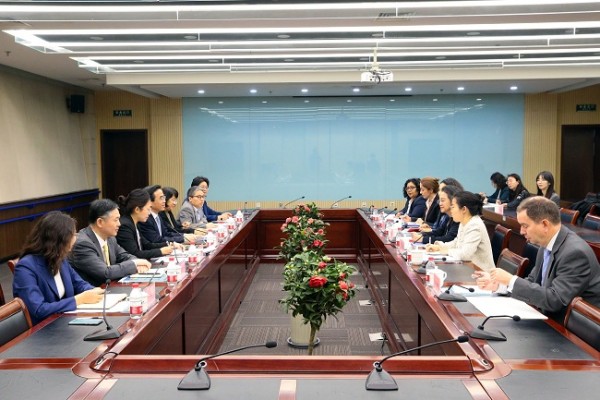
Cheng Kai, chairman of the China Disabled Persons' Federation (CDPF), meets with Armida Salsiah Alisjahbana, executive secretary of the Economic and Social Commission for Asia and the Pacific (ESCAP) of the United Nations, in Beijing, April 11, 2024. [Photo/cdpf.org.cn]
Cheng Kai, chairman of the China Disabled Persons' Federation (CDPF), met with Armida Salsiah Alisjahbana, under-secretary-general of the United Nations and executive secretary of the UN's Economic and Social Commission for Asia and the Pacific (ESCAP), on April 11. Li Dongmei, vice-chairperson of the CDPF, attended the meeting.
Cheng extended a warm welcome to Alisjahbana on her visit. He said that the Chinese government attaches great importance to the development of the cause of persons with disabilities. By adhering to a people-centered development concept and in accordance with the spirit and goals of the United Nations Convention on the Rights of Persons with Disabilities and the 2030 Agenda for Sustainable Development, China has taken a series of effective measures in the fields of rehabilitation, education, employment, rights protection, and social inclusion, leading to significant improvements in the lives of persons with disabilities, according to Cheng.
In 2023, Chinese lawmakers adopted a new law on building a barrier-free living environment, further improving the legal system for safeguarding the rights and interests of persons with disabilities, he noted. The "Beautiful Workshop" project, which aims to help women with disabilities find jobs and increase their income, has achieved tangible results by equipping disabled women with handicraft skills, he said, adding that the campus of the University of Rehabilitation has been established in Qingdao, East China's Shandong province, to train more high-level professional rehabilitation talents.
Cheng thanked the ESCAP for its support to the cause of persons with disabilities in China and its contributions to the development of disability affairs in the Asia-Pacific region. He said the CDPF will continue to support the Asian and Pacific Decade of Persons with Disabilities (2013–2022) and initiatives of the ESCAP in the field of disability affairs, and will jointly promote the integrated development of disability affairs in the Asia-Pacific region.
Alisjahbana highly praised the achievements made in the development of the cause of persons with disabilities in China and the important role played by China in promoting disability affairs in the Asia-Pacific region. She said the ESCAP looks forward to further strengthening cooperation with the CDPF, especially in such areas as integrated employment, technology assistance for the disabled, and the construction of rehabilitation universities, to promote experience sharing and mutual learning in disability affairs in the region.
The ESCAP is one of five regional commissions of the United Nations. In 1992, the ESCAP launched the Asian and Pacific Decade of Disabled Persons (1993-2002), which was initiated by China, in Beijing. The program has entered its fourth phase today and become a model of regional cooperation on disability affairs.
Officials from the Ministry of Foreign Affairs of China, as well as the International Department and the Research Office of the CDPF participated in the meeting.